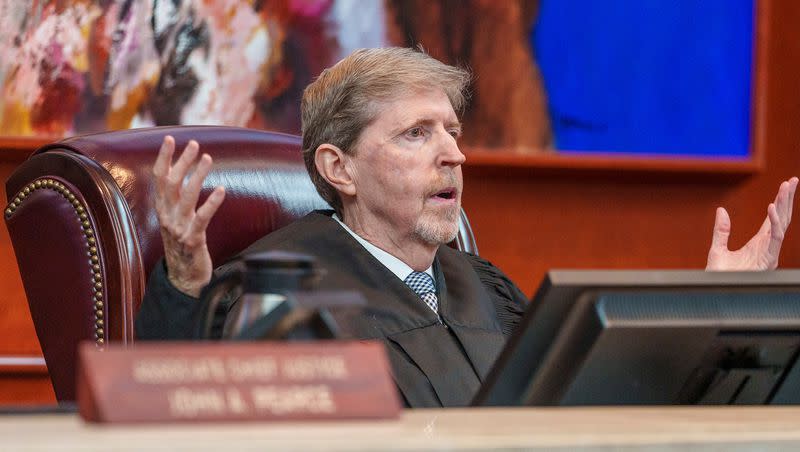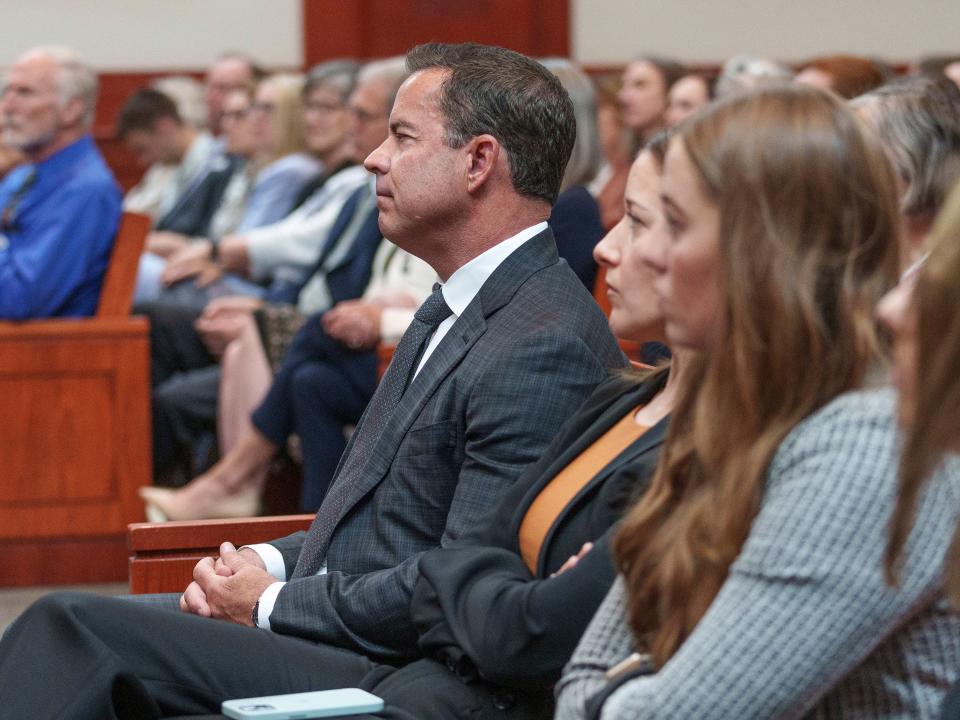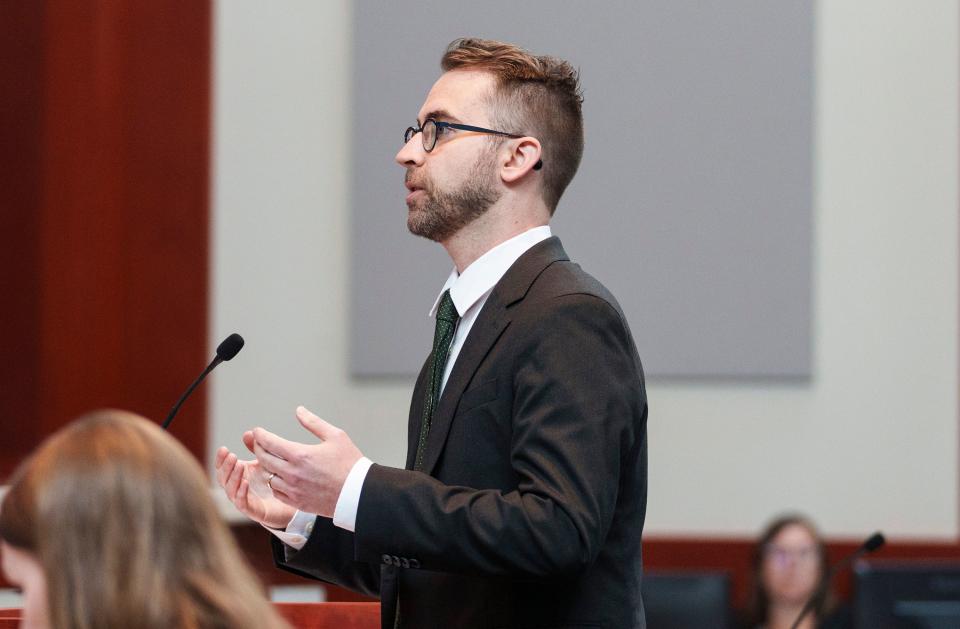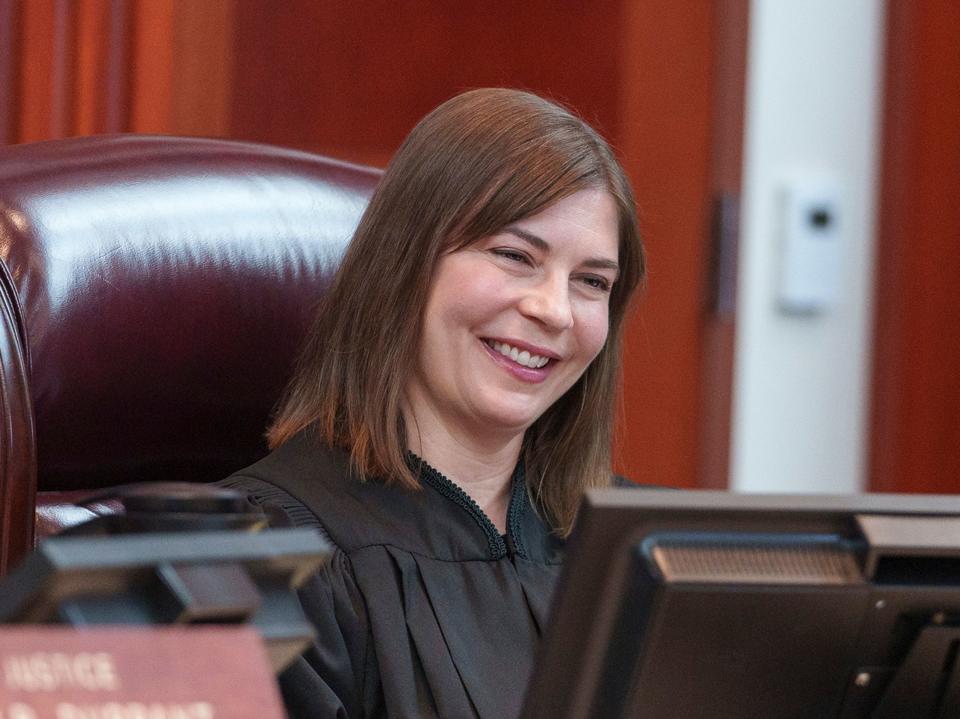Did Legislature take power from the people? Utah high court weighs lawsuit

The Utah Supreme Court heard oral arguments Tuesday over a challenge brought against the state’s recently enacted redistricting maps, though a decision in the case isn’t expected right away.
The lawsuit, which was filed last year, alleges that the GOP-dominated Utah Legislature undermined Utahns’ constitutional rights to participate in free elections when it adopted new congressional maps that represent an “extreme partisan gerrymander,” which heavily favor Republicans in each district after splitting Salt Lake County four ways.
The lawsuit was moved to the state Supreme Court after the Legislature appealed a decision by a lower-court judge who denied requests by the Legislature to have the case dismissed.
The plaintiffs include the League of Women Voters of Utah, Mormon Women for Ethical Government and several individuals.
“We commend the courage of the plaintiffs in their pursuit of fair electoral districts,” said Katie Wright, executive director of Better Boundaries, the group that sponsored the 2018 ballot initiative to create an independent redistricting commission. “These are individuals and organizations who care deeply about fairness and equality under the law and we’re grateful for their principled sincerity. ... We trust the Utah Supreme Court will evaluate the arguments from today and adhere to the principles of justice.”
Under Proposition 4, which voters approved in 2018, an independent commission was given the power to create new political boundaries every 10 years, but the Legislature later watered down the proposition. It ultimately reached a compromise with Better Boundaries wherein the commission makes recommendations to lawmakers, who have the final say.
But lawmakers ignored the proposals from the commission and enacted their own maps during the most recent redistricting cycle in 2021.
The Legislature’s decision to amend the Proposition 4 ballot initiative is at the heart of the case, League of Women Voters of Utah v. Utah State Legislature, and the justices are now mulling whether the courts have standing to weigh in on political maps or the process by which they are created.
“We appreciate the Utah Supreme Court’s taking the time to hear our arguments and reviewing our case,” Utah Senate President Stuart Adams, R-Layton, and House Speaker Brad Wilson, R-Kaysville, said in a joint statement to KSL.com. “We also thank our legal counsel for their thoughtful efforts in representing the Legislature and legislative process.”

Legislative process vs. ballot initiatives
The Utah Constitution makes clear that “all political power is inherent in the people” and also makes the Legislature and the “the people of the state of Utah” co-equals in terms of passing legislation. Utahns’ power to legislate comes in the form of ballot initiatives, although they have been used only a handful of times.
In overturning the role of the independent commission as outlined by Proposition 4, the plaintiffs argued the Legislature was ignoring the power of the voters which is supposed to be equal.
The government’s lawyer argued that the Legislature also rules on behalf of the people and “shall divide the state into congressional, legislative and other districts accordingly,” as stated in Article IX of the Utah Constitution. The Legislature is also more responsive and accountable to the will of the voters than an independent commission, argued Taylor Meehan, counsel for the defendants.
“In a way we’re outsourcing redistricting, and frankly, putting politics underground instead of in public,” she said. “It’s politics all the way down. Redistricting is all about politics ... and the people accountable for that since the founding have been the Legislature.”

Attorney Mark Gaber, who argued on behalf of the League of Women Voters of Utah, said that when it comes to redistricting, voters can’t easily hold their representatives to account if the district lines have been drawn in a way that favors those same lawmakers.
“That’s the problem with a partisan gerrymander is that ... once you take the power from the people, you have it — the Legislature has it. They can draw the lines for themselves so that it doesn’t matter what the people want,” he said.
The lawsuit challenges Utah’s congressional map, but any ruling would likely also impact the state House and Senate maps, which were drawn by the same process.
Gaber said the plaintiffs are asking that the districts be drawn in a way that doesn’t systematically dilute the voting power of any group of voters. When asked by Justice Jill Pohlman if equal protection of voters requires that each district be competitive and give Republicans and Democrats equal chances to win, he said, “No. Practically, I don’t think you can do that in Utah.”
“But ... if you sit down and try to draw a congressional map of Utah ... you have to try very hard to come up with what the Legislature achieved here,” he continued. “We’re not asking the court to draw the line between fair or competitive or safe or any of that. We’re asking the court to ensure that people are not treated nonuniformly in the legislative process, and that’s exactly what happened here.”


